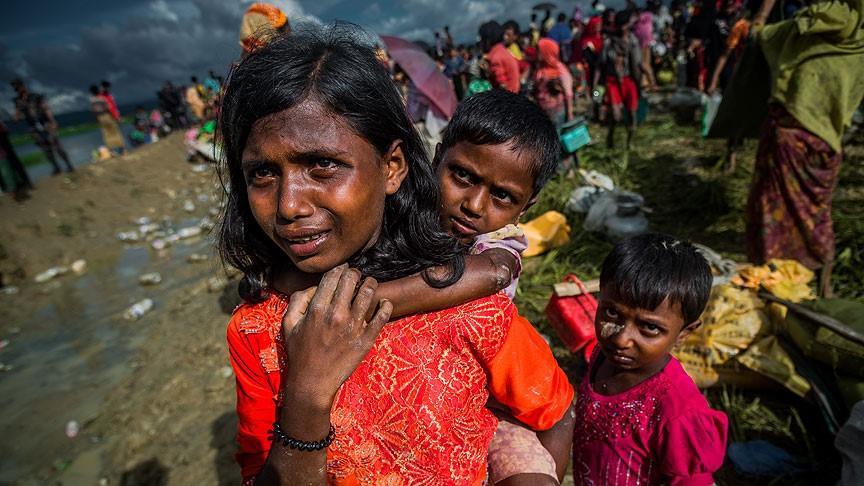Myanmar deprives Rohingya of their identity
Rohingya are indigenous to Myanmar, going as far back as seventh century

By Sadik Kedir Abdu
ANKARA
Since its independence in 1948, Myanmar has faced an identity crisis, especially concerning its minorities such as the Rohingya Muslim community in Rakhine state.
Rohingya Muslims have been suffering ethnic cleansing by Myanmar state forces.
Out of 135 Myanmar's ethnicities, the majority are Burmese, constituting more than 60 percent, with Rohingya making up only 4 percent of the population.
Historical records show Rohingya are indigenous to Myanmar, going as far back as the seventh century. They are also said to have led the place as the Arakanese Kingdom independently during the 15th century.
Myanmar, formerly known as Burma, was colonized by Britain in 1885.
After the military took over in 1962, deep scars left behind by former colonial masters spurred various disputes in the country.
Broken down by religion, 89 percent of Myanmar’s population are Buddhists, while 4 percent are Christians, and 4 percent Muslims.
The current spate of violence in Myanmar mainly targets Rohingya Muslims; it began in August last year under the pretext of Myanmar police stations coming under attack.
Since the country gained independence, Rohingya Muslims have been protesting and demanding equal rights as citizens of Myanmar. Some were also forced to take up arms against the government.
Systematic genocide
The beginning of the systematic Rohingya genocide goes back to 1962-1974, when the military government of Ne Win arrested leaders from the minority group. Many Rohingya fled their country, and some perished on their way to Pakistan and India.
The systematic genocide carried out in 1977 under Operation Nagamin (Dragon King) led to the first exodus of over 200,000 Rohingya to Bangladesh the next year.
During the second exodus of 1991-1992, some 250,000 Rohingya crossed over into Bangladesh after facing forced labor, rape, and religious persecution by the national army, according to Human Rights Watch.
Myanmar’s government then tried to deprive the Rohingya of their citizenship by claiming they had illegally immigrated from Bangladesh and did not deserve to be included alongside the 135 indigenous ethnic groups in line with a 1982 law.
In 2006, anti-Muslim riots and a false report of a Muslim man raping a Buddhist woman allowed Myanmar’s government to deny the Rohingya even the right to marry.
After 2011, the nominally civilian Thein Sein government was sworn in but nothing changed for the Rohingya. This lack of progress came despite some optimism that perhaps things would improve after Nobel laureate Aung San Suu Kyi became the nation’s de facto leader in 2015.
But Suu Kyi remained silent in the face of the Rohingya persecution.
The next year saw another deadly clash between Buddhists and Muslims in the Rakhine, which flared up after the alleged rape and murder of a 27-year-old Buddhist woman and the murder of 10 pilgrims.
World fails the Rohingya
In a report, the UNHCR refugee agency said nearly 170,000 people likely fled Myanmar in 2012 alone.
Since Aug. 25, 2017, more than 24,000 Rohingya Muslims have been killed by Myanmar’s state forces, according to the Ontario International Development Agency (OIDA).
In a recent report, Forced Migration of Rohingya: The Untold Experience, the OIDA raised the estimated number of murdered Rohingya to 23,962 (± 881) from a Doctors Without Borders figure of 9,400.
More than 34,000 Rohingya were also thrown into fires, while over 114,000 others were beaten, the OIDA report said, adding that 17,718 (±780) Rohingya women and girls were raped by Myanmar’s army and police. Over 115,000 Rohingya houses were also burned down and 113,000 others vandalized, it added.
According to Amnesty International, more than 750,000 Rohingya refugees, mostly children and women, have fled Myanmar and crossed into Bangladesh after Myanmar forces launched a crackdown on the minority Muslim community.
The Rohingya, described by the UN as the world's most persecuted people, have faced heightened fears of attack since dozens were killed in communal violence in 2012.
The UN has documented mass gang rapes, killings -- including of infants and young children -- brutal beatings, and disappearances committed by Myanmar state forces. In a report, UN investigators said such violations may have constituted crimes against humanity.
Anadolu Agency website contains only a portion of the news stories offered to subscribers in the AA News Broadcasting System (HAS), and in summarized form. Please contact us for subscription options.







